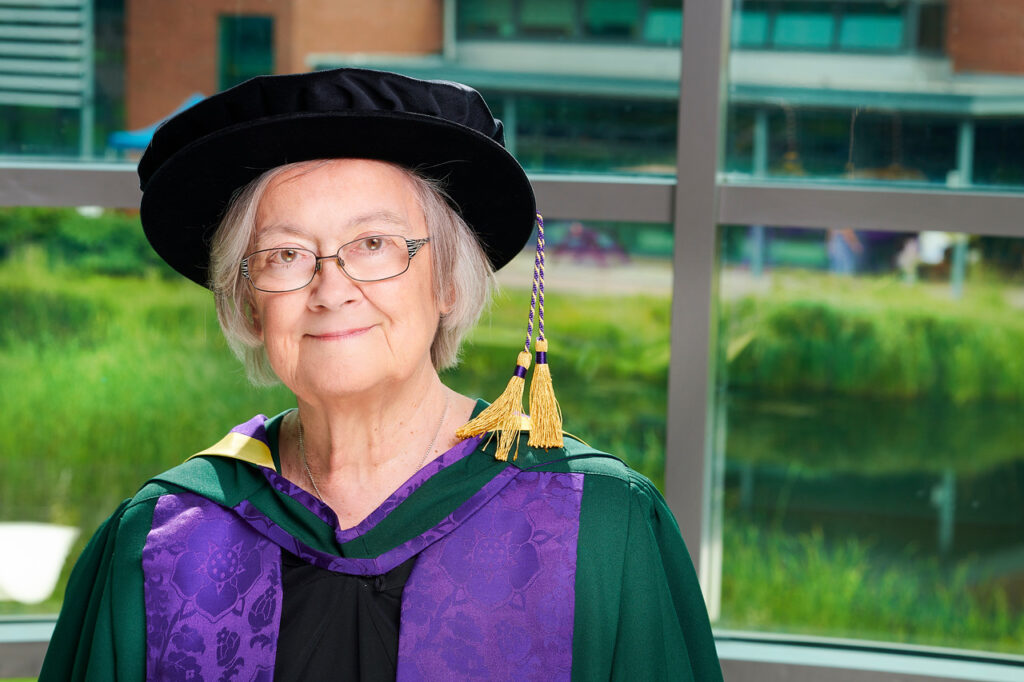
In honour of the 90th anniversary of Edge Hill University and International Women’s Day, we were privileged to receive a visit from Lady Brenda Hale. Law students Ella Weatherburn and Jessica Casey tell us more about this pioneering honorary Edge Hill doctor.
The extensive and impressive career of Lady Hale began with a humble background, growing up in rural North Yorkshire, with most people staying in the farming industry.
When Lady Hale was a child, she described how only 2.5% of women from the ages 18 to 21 attended university, with an even lower percentage going on to a career in law. This meant when her father passed away at 13 and her mother had to find work to support her family, her mother become the future judge’s first female role model. Her mother became a headmistress, teaching Lady Hale the importance of education and of being able to support herself. This was especially important to Lady Hale, with this focus leading to her growing up to become the first of her school to go to Cambridge. She studied law, a subject that her interest began with from British constitutional history.
Following her graduation from Cambridge, with no women on the law faculty, she went on to teach at Manchester University. During that time she worked to qualify as a barrister, with a small number of women at the time practicing at the bar. Her academic writing, on mental health law, was published. This led to her first judicial job on mental health tribunals, a passion of hers.
Throughout her career, Lady Hale has shown a passion for family law and its reform focusing on child welfare. She played a significant role in the introduction of the Children Act 1989 as well as the Divorce Reform 2022. She has always made sure to prioritise the welfare of children, with the Children’ Act being viewed as a vital piece of legislation for children. Not only does her career include many personal achievements but she has ensured that her success also benefits others in a more vulnerable position. Her career has benefited both women in law and society as a whole in a profound and widespread way.
Not only was she the first women in 1984 to be appointed to a law commission, but also the youngest ever appointee, a further demonstration of her dedication and talent. The numerous firsts that Hale has achieved, even in her early career, shows the radical progress she made for women within the legal field.
In 1994, Hale became a High Court judge and then in 1999 was appointed to the Court of Appeal, becoming the second women to ever be appointed. During her time at this court, she was faced with a whole range of civil law cases including family law as well as questions of law rather than fact. Then, in 2004, she became the only women ever to become a Lord of Appeal in ordinary. This again added to her legacy of being the first to achieve landmark positions, making even more progress for women in law.
It was then in 2009 that she became the first female justice on the Supreme Court, an achievement that made it further possible for women to be successful in the legal world. Lady Hale highlighted the importance of diversity within the judiciary, with diversity improving decision making. She underlined how judges’ decisions can impact society. She further recognised the lack of persons of colour on the Supreme Court and the impact that the lack of diversity has on that body.
It is clear that the long journey Hale took, becoming the first women to progress as a judge to the Supreme Court, was trailblazing for women in law. It is a result of her hard work and her fighting against conventions that she became so successful. Many women look to her as a role model within law and her visit was inspirational for those attending her lecture in showing the many possibilities today’s women have within law.
Ella Weatherburn and Jessica Casey.
